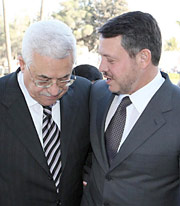
Discussions probably centered around George's Christmas wish list
There should be absolutely no doubt in anyone’s mind that Bush and Rice’s imminent visit to the Middle East is going to be more than a mere courtesy call. Bush and Rice will be arriving in Amman, Jordan on Wednesday and meeting with Iraqi PM Nouri al-Maliki there. It seems premature to expect any major announcements on Iraq and Syria. Deliberations about Iraq are still ongoing (in a number of different fora), while the debate about a possible détente with Damascus has only intensified as a result of the Gemayel assassination. The area in which the administration will deliver something to appease its allies/critics in the Arab world and in Europe is on theIsraeli-Palestinian front. The Israelis already know that something is going to happen, and they’ve made sure to align themselves with the administration - in advance.
Olmert’s recent declarations about his determination to go ahead with a withdrawal from the West Bank and his willingness to offer the Palestinians concessions, as well as the surprising ceasefire agreement reached with the Palestinians in Gaza, at a time when everything was pointing to an imminent invasion of the Gaza Strip by the IDF, must be understood in this context. Israel believed that it had a good case for launching a large scale offensive in the Gaza Strip – the tragic deaths of more innocent civilians in Sderot and the western Negev, the injury of one of Amir Peretz’s security guards by a rocket, and the frightening specter of Qassams reaching the town of Ashqelon, add up to a very convincing casus belli. In addition, the past weeks have seen no shortage of ominous pronouncements by officials (e.g. Shin Beth chief Yuval Diskin) about Hamas’s expanding arsenal and of “leaks” by military officers warning of a repeat of the Lebanon war on Israel’s southern front. Nevertheless, suddenly, miraculously, Israel agreed to enter into a ceasefire, and to withdraw IDF forces from the Gaza Strip, which was crawling with special forces and tanks only last week (as the world focused on the Gemayel assassination, the IDF was in the midst of what seemed to be the precursor to an invasion of the Gaza Strip). The launching of additional Qassams hours after the ceasefire came into effect did not draw any military reaction and IDF commanders were even ordered not to respond if they noticed rocket-launching squads in the Gaza Strip.
The sudden Israeli reversal must be seen as a gesture by Olmert to Bush, who is obviously desperate for some good news. Bush’s other allies, Jordan’s King Abdullah II and Palestinian President Mahmud ‘Abbas did their part by today by congratulating Olmert’s initiative. What remains to be seen is whether the administration’s pending announcement is going to be substantive, or whether it will be just another in a long series of declarations.
Update: The Canada-Israel committee has a transcript of Olmert's policy speech delivered on Monday, November 27 at Sde Boqer (the kibbutz where Ben-Gurion spent his last days and where his grave is today. It's surprising how little attention the speech received. It actually has some very remarkable declarations that are a clear nod to the Bush administration and which recognize America's increasing indebtedness to the Saudis and its other Arab friends:
We will seek the assistance of those neighboring Arab States which strive for a peaceful solution to the conflict between us, including: the Kingdom of Jordan, Egypt, Saudi Arabia and the Gulf States, in order to benefit from their experience and receive backing for direct negotiations between us.
The voices emanating from those States regarding the need for recognition and normalization of relations with the State of Israel – including, for example, some parts in the Saudi peace initiative – are positive, and I intend to invest efforts in order to advance the connection with those States and strengthen their support of direct bilateral negotiations between us and the Palestinians.
I have been following with great appreciation the serious efforts made by those States to bring about a cessation of violence in the region, and I respect their sincere desire to create a new atmosphere between us, so as to facilitate a solution to the conflict.
It sounds like the Saudi Peace Initiative is being revived. Olmert comes out quite the statesman in this latest speech. He'll continue to be maligned in Israel for his failings during the Lebanon war, but he has redeemed himself, in my view, as a clever diplomat. Rather than pulling a Yitzhaq Shamir and having the State Department impose a plan on Israel, Olmert is being proactive and trying to co-opt the new ideas being floated, while at the same time twisting them to conform to Israeli requirements (note his insistence on "direct bilateral negotiations" between Israel and the Palestinians, rather than multi-lateral Arab-Israel peace negotiations; Israel has always favoured negotiating with different Arab groups and states separately.)
2 comments:
Very good analysis. The sudden turn-around on the part of Olmert, which was followed by sharp protests from the military, definitely needed an explanation.
I'm hoping for the best to come out of this, but I don't see a whole lot of ground for optimism. Once this cease fire ends, the Palestinians will have dug themselves in nicely and the Qassam fire on Israel will resume. The Europeans and the various human rights bodies in the world will continue to present the rocket attacks as insignificant or harmless, while condemning Israel's attempts to stop them.
Post a Comment